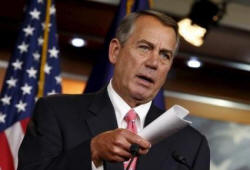|
 Republicans
reach deal for budget plan, target Obamacare Republicans
reach deal for budget plan, target Obamacare
 Send a link to a friend
Send a link to a friend
[April 28, 2015]
By David Lawder
WASHINGTON (Reuters) - Republican budget
negotiators on Monday reached a compromise deal for the first joint
House-Senate budget in six years, one that seeks to boost military
spending while calling for deep cuts to social programs to eliminate
deficits in a decade.
|
|
 But congressional aides said the deal, to be formally unveiled on
Tuesday, will stop well short of directing appropriations committees
to actually implement those cuts. But congressional aides said the deal, to be formally unveiled on
Tuesday, will stop well short of directing appropriations committees
to actually implement those cuts.
Instead, it will focus on the use of budget procedural tools on
repealing or replacing President Barack Obama's signature health
reform legislation, the aides said.
Passing a budget will allow Republicans the opportunity to use
budget "reconciliation" procedures to dismantle "Obamacare" with
only a simple majority vote in the Senate, rather than a
near-impossible 60 vote margin that would require some Democratic
support.
As reported by Reuters last week, the compromise budget will exclude
Representative Paul Ryan's longstanding proposals to convert the
Medicare health program for seniors to a system of subsidies for
largely private health insurance.
 The House of Representatives had included the Medicare reforms in
its budget for a fifth straight year, calling for the changes to
start in 2024. But the more cautious Senate did not include the
proposals, adopting similar savings goals for the program as Obama
proposed.
The Republican budget will nominally maintain statutory "sequester"
spending caps for the military and domestic federal agencies for the
2016 fiscal year starting Oct. 1. But at the same time it skirts the
caps by providing an additional $38 billion in military spending via
a special off-budget account for war operations.
The final language is expected to drop Senate language that would
have required such war funding to be offset with other savings.
[to top of second column] |

While the budget will help guide the process of crafting spending
bills for the next fiscal year, most of it is non-binding and
represents a policy manifesto for Republicans who now control both
chambers of Congress.
Once the budget is passed, the fiscal debate will shift to a
separate effort to find other savings or revenue increases to ease
the sequester spending constraints that were enacted in a 2011
budget law.
If Congress fails to lift the spending caps, military and domestic
agency spending next year would stay flat at about $1 trillion, the
same level as a decade ago. This also would make passage of spending
bills more difficult, raising the risk of a government shutdown on
Oct. 1.
(Reporting by David Lawder; Editing by Kevin Drawbaugh and David
Gregorio)
[© 2015 Thomson Reuters. All rights
reserved.]
Copyright 2015 Reuters. All rights reserved. This material may not be published,
broadcast, rewritten or redistributed.
 |